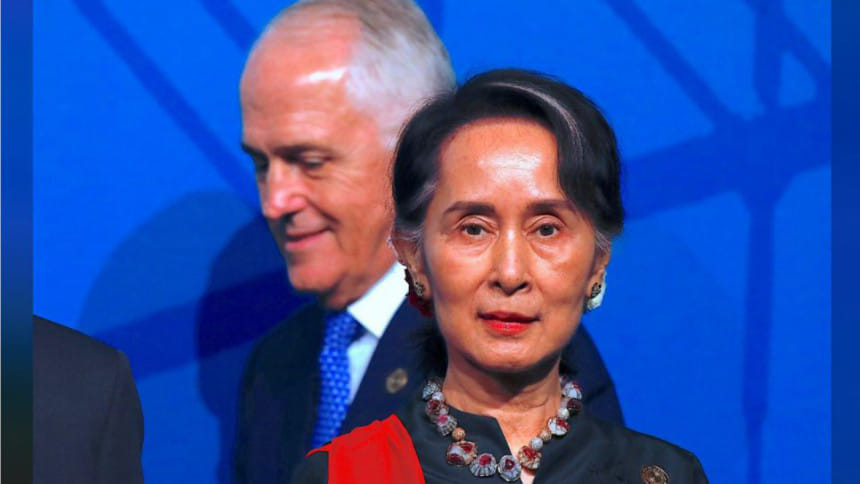Suu Kyi spoke at length about Myanmar troubles: Turnbull

Myanmar leader Aung San Suu Kyi spoke at length about her country's troubled western state of Rakhine at a Sydney conference on Sunday and appealed to Southeast Asian neighbors for help, Australia's prime minister said.
"We discussed the situation in Rakhine state at considerable length today," Prime Minister Malcolm Turnbull told reporters at the end of a summit of Association of Southeast Asian Nations (ASEAN) and Australia, much of it held behind closed doors.
"Daw Aung San Suu Kyi addressed the matter comprehensively at some considerable length herself... She seeks support from ASEAN and other nations to provide help from a humanitarian and capacity-building point of view," he said, using a Burmese honorific.
Suu Kyi's spokesman, Zaw Htay, was not immediately available for comment on Turnbull's comments.
Turnbull did not tell reporters whether Suu Kyi gave details of what support she was seeking or whether she spoke specifically about violence against the Rohingya, however ASEAN's Coordinating Centre for Humanitarian Assistance has been providing some aid since October.
UN officials say nearly 700,000 Muslim Rohingya have fled Buddhist-majority Myanmar to Bangladesh after militant attacks on Aug. 25 last year sparked a crackdown, led by security forces, in Rakhine that the United Nations and United States have said constitutes ethnic cleansing.
The UN independent investigator on human rights in Myanmar, Yanghee Lee, said in Geneva this month she saw growing evidence to suspect genocide had been committed.
Myanmar denies the charges and has asked for "clear evidence" of abuses by security forces.
Since coming to power in 2016, Suu Kyi - who won the 1991 Nobel Peace Prize for her struggle for democracy - has failed to condemn the violence against the Rohingya.
Australia's attorney general on Saturday rejected a private bid by activist lawyers to have Suu Kyi face charges for crimes against humanity, saying she has diplomatic immunity.
In response to questions posed by Reuters about the lawyers' move, Suu Kyi spokesman Zaw Htay said earlier in the day such "pressure" was unhelpful in solving the conflict in Rakhine, which he called "the Bengali problem" - using a term to describe the Rohingya that suggests they are interlopers from Bangladesh.
Militants from the Arakan Rohingya Salvation Army (ARSA) had instigated the violence with attacks on government forces in October 2016 and August 2017, said Zaw Htay, director general at the State Counsellor's Office in Myanmar's capital, Naypyitaw.
"All of this happened because of ARSA. The government did nothing," he said in response to a question about the legal move.
"Those who are putting pressure like this need to be careful that doesn't become encouraging terrorists."
Singaporean Prime Minister Lee Hsien Loong said it was a "complex inter-communal situation" which ASEAN leaders would continue to discuss "frankly".
"It's an issue which is also in the public attention and it's one of those where intense public attention sometimes makes it more difficult to solve," he added.
Suu Kyi's attendance at the ASEAN summit, hosted by Australia despite it not being a member of the 10-nation bloc, drew street protests in Sydney on Saturday.

 For all latest news, follow The Daily Star's Google News channel.
For all latest news, follow The Daily Star's Google News channel. 







Comments